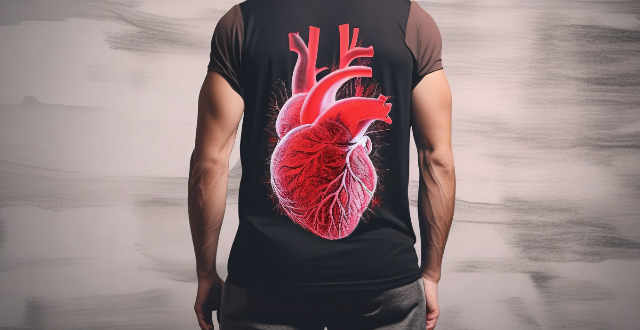Heart Weather

Can climate change lead to an increase in cardiovascular diseases ?
The article discusses the relationship between climate change and cardiovascular diseases, highlighting how extreme heat events, changes in air quality, and extreme weather patterns can contribute to an increase in heart-related illnesses. It explains how dehydration and electrolyte imbalances caused by heat stress can strain the heart, leading to chest pain, shortness of breath, and even heart failure. The article also points out that rising temperatures can cause pollutants like ozone and particulate matter to become more concentrated in the air we breathe, irritating the lungs and reducing oxygen uptake, which can strain the heart. Additionally, extreme weather events like hurricanes, floods, and wildfires can have both direct and indirect effects on cardiovascular health by causing physical trauma, stress, lack of access to medical care, and disruptions in medication adherence and continuity of care for those with chronic cardiovascular diseases. The article concludes by emphasizing the importance of taking steps to protect cardiovascular health, such as staying hydrated during hot weather, monitoring air quality, and having emergency plans in place for natural disasters.

Can exercise reverse heart disease ?
Heart disease is a major cause of death worldwide, and it can be devastating to those affected. While there are many treatments available for heart disease, including medication and surgery, some people wonder if exercise can reverse the damage caused by heart disease. There is evidence that regular exercise can help prevent and manage heart disease by improving cardiovascular health, managing weight, lowering blood pressure, improving cholesterol levels, and reducing stress. However, there is no conclusive evidence that exercise can completely reverse heart disease. Despite this, there are still many benefits to regular exercise for heart health. If you have been diagnosed with heart disease or are at high risk for developing it, talk to your doctor about starting an exercise program. They can help you create an exercise plan that is safe and effective for your individual needs and goals.

How does age affect heart rate during exercise ?
Age affects heart rate during exercise by altering the structure and function of the aging heart, reducing maximum heart rate, shifting autonomic regulation towards sympathetic dominance, and decreasing cardiac reserve. Older individuals can still improve their cardiovascular fitness through regular exercise and lifestyle modifications.

Can heart rate monitoring help prevent overexertion during exercise ?
Overexertion during exercise can lead to fatigue, muscle soreness, and injuries. Heart rate monitoring is a technique used to measure the number of times a person's heart beats per minute (bpm). By monitoring your heart rate, you can determine personalized training zones based on age, fitness level, and goals, providing real-time feedback on current heart rate during exercise. Recovery time is essential for preventing overexertion, and heart rate monitoring helps determine how long it takes for the body to return to its resting state. Best practices for heart rate monitoring include choosing the right device, calibrating regularly, warming up properly, staying hydrated, and listening to your body. Following these guidelines and listening to your body can help prevent overexertion during exercise while maximizing its benefits.

Can physical activity reduce the risk of heart disease ?
Regular physical activity can significantly reduce the risk of heart disease by improving blood circulation, strengthening heart muscles, and reducing major risk factors such as high blood pressure, high cholesterol, and diabetes. Recommended types of exercise include aerobic activities and strength training. Following guidelines from health organizations like the WHO can help maintain cardiovascular health.

How accurate are fitness trackers in monitoring heart rate ?
The accuracy of fitness trackers in monitoring heart rate can be affected by various factors, including device quality, skin type and color, movement, and environmental factors. To improve the accuracy of your fitness tracker's heart rate monitor, it is recommended to choose a reputable brand with advanced sensors and algorithms, wear your device correctly, calibrate your device, and use multiple sensors or a chest strap for better results. By following these tips, you can make more informed decisions about your health and fitness goals.

How often should I check my heart rate while exercising ?
Checking your heart rate is an important part of staying healthy and fit. However, how often you should check it depends on several factors, including your age, fitness level, and overall health. Here are some guidelines to help you determine the optimal frequency for checking your heart rate during exercise: For beginners: Check your heart rate every five minutes during the first few weeks of training to get a sense of your target heart rate range and adjust accordingly as you become more comfortable with the activity. For experienced athletes: Once or twice per workout is sufficient for experienced athletes who have established a good foundation in their fitness routine. This will allow them to focus more on their form and intensity without constantly worrying about their heart rate. For older adults or those with pre-existing health conditions: Older adults or those with pre-existing health conditions may need to monitor their heart rate more frequently than younger individuals. It's recommended that they check their heart rate at least once per workout and perhaps even before and after each session to stay safe and ensure they're not overexerting themselves.

In what ways can heart rate monitors improve athletic training ?
Heart rate monitors significantly enhance athletic training by enabling targeted intensity, objective data analysis, recovery monitoring, pacing strategies, and individualized training. To use them effectively, athletes should establish baseline measurements, set clear goals, create a structured plan, continuously monitor progress, and incorporate technology for easy tracking and insights.

What are the benefits of monitoring heart rate during exercise ?
Monitoring your heart rate during exercise offers numerous benefits, including improved workout efficiency, better recovery, reduced risk of injury, increased motivation, and improved cardiovascular health. By keeping an eye on your heart rate, you can ensure you're getting the most out of every workout while also taking care of your body.

What is the best way to monitor heart rate during exercise ?
Monitoring heart rate during exercise is crucial for staying healthy and achieving fitness goals. The best way to monitor heart rate during exercise depends on personal preferences and fitness goals. Wearable heart rate monitors are convenient and non-invasive, while chest straps provide accurate data. Fingertip devices are affordable and easy to use, but less accurate than other methods. Smartphone apps are free or inexpensive, but may not work well in certain situations. Ultimately, the choice between these methods should be based on individual needs and preferences.

What is the difference between weather and climate ?
This text defines and differentiates between weather and climate. Weather is described as a short-term phenomenon, characterized by its variability, localized nature, and influence on daily activities. In contrast, climate is defined as a long-term pattern, distinguished by its stability, regional scope, and impact on ecosystems and agriculture. The text emphasizes the importance of understanding these differences for decision-making in various aspects of human life.

What is the ideal heart rate for different types of exercises ?
When it comes to exercise, knowing your ideal heartWhen it comes to exercise, knowing your ideal heartimizing the benefits of your knowing your ideal heart rate is crucial for maximizing the benefits of your workout while minimizing the risk of injury. The recommended heart rate ranges vary depending on the type of exercise and your fitness level. For aerobic exercise, beginners should aim for 50-60% of their maximum heart rate (MHR), intermediate exercisers 60-70% of MHR, and advanced exercisers 70-85% of MHR. High-intensity interval training (HIIT) requires higher intensity, with beginners aiming for 70-80% of MHR, intermediate exercisers 80-90% of MHR, and advanced exercisers 90-100% of MHR. Resistance training also varies by fitness level, with beginners aiming for 50-60% of MHR, intermediate exercisers 60-70% of MHR, and advanced exercisers 70-85% of MHR. Yoga and Pilates are low-impact exercises that focus on flexibility, balance, and core strength, with beginners aiming for 40-50% of MHR, intermediate exercisers 50-60% of MHR, and advanced exercisers 60-70% of MHR. By monitoring your heart rate and staying within the recommended ranges, you can ensure that you're exercising safely and effectively.

How does climate change influence weather patterns and extreme weather events ?
Climate change significantly affects weather patterns and increases the frequency and intensity of extreme weather events. It influences global wind patterns, changes in ocean currents, and variations in seasonal patterns. Moreover, it leads to more frequent and intense heatwaves, severe storms and hurricanes, extreme precipitation events, and droughts. These impacts highlight the urgent need for action to mitigate climate change and adapt to its effects.

How can I use heart rate monitoring to improve my workout routine ?
Using a heart rate monitor can significantly improve your workout routine by providing valuable insights into your body's response to exercise. Here's how you can leverage heart rate monitoring to optimize your fitness regimen: - Understanding Heart Rate Zones: Your heart rate varies depending on the intensity of your workout. By understanding these heart rate zones, you can tailor your workouts to achieve specific goals, such as fat burning, endurance building, or performance improvement. - Setting Goals Based on Heart Rate: Establish clear objectives for each workout session based on your heart rate data, such as endurance training, weight loss, or performance enhancement. - Tracking Progress: Consistently monitor your heart rate during workouts to track progress, including recording resting heart rate and assessing recovery time. - Adjusting Intensity: Modify your workout intensity based on your heart rate feedback, such as increasing intensity if you're consistently below your target heart rate zone or decreasing intensity if you're above it. - Preventing Overtraining: Use heart rate data to avoid overtraining by staying within recommended heart rate limits and recognizing signs of overexertion. - Personalizing Your Workouts: Customize your routine with heart rate in mind by incorporating different training methods and experimenting with different activities to see which ones give you the desired heart rate response.

How do weather conditions affect building safety during construction ?
The text discusses the impact of various weather conditions on building safety during construction. It highlights the risks associated with extreme heat, cold weather, rain and water, strong winds, snow and ice, and lightning and thunderstorms. The conclusion emphasizes the importance of monitoring weather forecasts and adjusting working procedures to ensure worker safety.

Are there any risks associated with constantly monitoring heart rate during exercise ?
Monitoring heart rate during exercise is common but can pose risks like over-reliance on technology, psychological impacts, and physical risks. It's important to find a balance between using heart rate data and listening to your body's signals for a safe and enjoyable workout.

How can I monitor my heart rate during exercise for optimal health results ?
Monitoring your heart rate during exercise is crucial for efficiency, safety, and progress tracking. Tools include heart rate monitors, smartphone apps, fitness trackers, and chest straps. Before starting, consult a doctor and choose the right tool. During exercise, wear your monitor, warm up, stay in your target heart rate zone, adjust intensity, and cool down. After exercise, record data, analyze results, and rest. Best practices include calibrating devices, staying hydrated, being consistent, and listening to your body.

What are some examples of recent extreme weather events ?
This article discusses recent examples of extreme weather events that have caused significant damage to human life, property, and the environment. These include Hurricane Ida (2021), Australian Bushfires (2019-2020), California Wildfires (2020), European Heatwave (2019), Japanese Typhoon Hagibis (2019), and Indian Cyclone Amphan (2020). The article concludes by emphasizing the need for individuals, communities, and governments to take action to mitigate the effects of these events and adapt to changing weather patterns.

How does weather affect radio communication interference ?
The text discusses how weather conditions can impact radio communication interference. It lists various types of weather such as rainfall, fog, thunderstorms, snow, sunspots, wind, and humidity and explains how each type can affect radio signals. For example, raindrops can absorb and scatter radio waves, reducing the strength of the signal, while thunderstorms can produce static discharges that interfere with nearby frequencies. The text emphasizes the importance of considering these factors when planning and managing wireless communications networks.

What are some common mistakes people make when monitoring their heart rate during exercise ?
When monitoring heart rate during exercise, common mistakes include incorrect sensor placement, over-reliance on technology, misinterpreting data, not tracking recovery time, and ignoring other factors. It's important to wear the sensor correctly, understand technology limitations, consider individual differences, track recovery time, and take environmental and medication factors into account for accurate readings.

How does climate variability affect global weather patterns ?
The impact of climate variability on global weather patterns is substantial, affecting temperature, precipitation, wind patterns, and extreme weather events. Key influences include El Niño and La Niña phases, monsoon systems, altered rainfall distribution, jet stream variations, tropical cyclones, heatwaves, cold spells, storms, floods, and droughts. Long-term climate trends like global warming also significantly affect weather patterns. Understanding these interactions is crucial for predicting future conditions and addressing climate-related challenges.

How does weather affect traffic safety ?
Weather conditions significantly impact traffic safety, with adverse weather increasing the risk of accidents. Understanding how different weather conditions affect driving abilities and taking necessary precautions are essential for ensuring safety. Rain, snow, ice, fog, and wind all pose unique challenges to drivers, such as reduced visibility and slippery roads. To drive safely in these conditions, maintain vehicle readiness through regular maintenance and adjust driving habits by slowing down and increasing following distance. Additionally, being prepared for emergencies with an emergency kit and planning your route can further enhance safety. By prioritizing safety and adapting to weather conditions, drivers can significantly reduce the likelihood of accidents and ensure safer journeys for everyone on the road.

Is it safe to start an exercise program if you have a history of heart problems ?
Starting an exercise program is generally beneficial for overall health, but it's important to take precautions if you have a history of heart problems. Here are some factors to consider: 1. Consult with your doctor before starting any exercise program, especially if you have a history of heart problems. 2. Start slowly and gradually increase the intensity and duration of your workouts over time. 3. Choose low-impact exercises such as swimming, cycling, or yoga to improve cardiovascular health without putting too much strain on your heart. 4. Monitor your symptoms during and after exercise, and stop immediately if you experience any symptoms such as chest pain, shortness of breath, or dizziness. 5. Stay hydrated and nourished by drinking plenty of water and eating a healthy diet that includes plenty of fruits, vegetables, whole grains, and lean proteins.

What impact do extreme weather events have on consumer purchasing habits ?
Extreme weather events, such as hurricanes, floods, and heatwaves, significantly impact consumer purchasing habits. These changes in buying behavior are often driven by necessity, fear, and the desire to be prepared for future events. The text discusses the various ways extreme weather events can influence what and how consumers purchase. It also highlights the need for businesses and retailers to adapt to meet the changing demands and priorities of their customer base.

How do electric cars perform in cold weather conditions ?
Electric cars, while eco-friendly and cost-efficient, face challenges in cold weather, particularly affecting battery performance and range. Strategies like preconditioning and using warm garages can mitigate these issues. Cold weather also increases energy use for heating, but efficient practices can help manage this. Tire pressure and traction are other concerns that require attention. Despite these challenges, EVs maintain their quiet and smooth driving experience, even in cold conditions, with the advantage of instant torque beneficial in slippery situations.

How can we predict and prepare for extreme weather events ?
Predicting and preparing for extreme weather events is a critical aspect of modern society. With advancements in technology and scientific research, we now have the ability to forecast these events with greater accuracy than ever before. However, predicting and preparing for extreme weather events requires a multi-faceted approach that involves both scientific knowledge and practical preparation. In this article, we will explore some of the key ways in which we can predict and prepare for extreme weather events.

How do extreme weather events affect global climate change ?
Extreme weather events, such as hurricanes, floods, droughts, and heatwaves, have a significant impact on global climate change. They can exacerbate existing climate conditions and contribute to the overall warming of the planet by increasing greenhouse gas emissions, affecting ecosystems and biodiversity, disrupting agriculture and food production, and impacting human health and well-being. It is essential that we work together to mitigate the effects of extreme weather events and address the root causes of climate change to ensure a sustainable future for all.

What is the difference between weather forecasting and climate prediction ?
Weather forecasting and climate prediction are two related but distinct fields with different scopes, timescales, and methodologies. Weather forecasting focuses on short-term predictions for specific locations, while climate prediction looks at long-term trends and patterns globally.